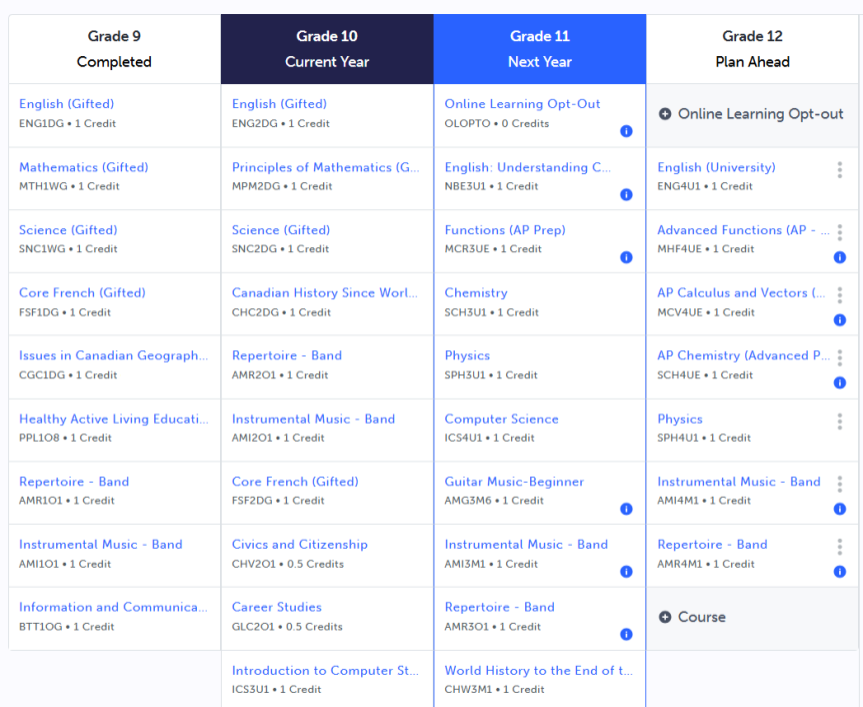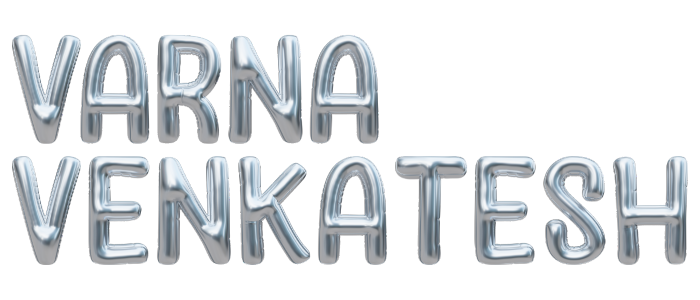My Education
High School
Grade 11:
Mandatory: English (NBE3U1), AP Prep Functions (MCR3UE), Chemistry (SCH3U1), Physics (SPH3U1)
Electives:
Computer Science (ICS4U1) - Learning how to program is an essential skills for engineers and I would submit it as my sixth U/M course
Guitar Music - Beginner (AMG3M6) - An easier course to balance my intensive course load and I practise my ability to learn new skills and retain information
Instrumental Music - Band (AMI3M1) & Repertoire - Band (AMR3O1) - Strategic option as I get a second credit while spending half the time in the class as compared to a normal class
Ancient Civilisations (CHW3M1)x - This course is an opportunity to learn about historical thinking and inquiry process. I will also get to interpret and analyse evidence, which is applicable to my future
Grade 12:
Mandatory: AP Advanced Functions (MHF4UE), AP Calculus & Vectors (MCV4UE), AP Chemistry (SCH4UE), English (ENG4U1), and Physics (SPH4U1)
Electives:
Instrumental Music - Band (AMI4M1) & Repertoire (AMR4M1) - Strategic option as I get a second credit while spending half the time in the class as compared to a normal class and I would receive the certificate for completing four years of music credits
My four year high school plan
University
I did a Bachelor of Applied Science (BASc) in Engineering Science (Biomedical Systems Engineering) at University of Toronto. I did the 4 year program without PEY Co-op (1 additional year). After this, I completed a Masters of Applied Science in Engineering and PhD with Dr. Name.
How did I get in?
I took 6 4U/M courses including Advanced Functions (MHF4U), Calculus & Vectors (MCV4U), Chemistry (SCH4U), English (ENG4U), Physics (SPH4U), and one additional U or M course.
I had to complete a supplemental application, which was an Online Student Profile. This included a list of my extracurricular activities. Then, I had to complete the Personal Profile, which consisted of one 250 word response in 10 minutes, one 2 minute video response with two minutes for preparation, and one 3 minute video response with three minutes for preparation.
What were some barriers that I faced?
Some barriers that I faced during my university experience include an intensive course load, difficult course material, limited internships and research positions, and limited Masters positions.
Intensive course load: Engineering Science features 6 courses per semester, and they are fixed courses in Years 1 and 2. This means that I had to do a lot of different subjects in one semester and I had a lot of labs, assignments, and tests.
I overcame this by planning well and using strategies to help me succeed such as the Pomodoro Technique and time blocking. I took courses in the summer to reduce my workload in Years 2 to 4.
Difficult course material: Engineering science has fixed courses in Years 1 and 2. In these courses, students explore a wide variety of subjects, such as quantum mechanics and material sciences. Due to the vast amount of material covered, I had to study very many difficult concepts.
I overcame this challenge by using different studying techniques to ensure that I understand all of the concepts. I used techniques such as spaced repetition and active recall. I also overcame this problem by effectively using my time and using techniques to help me focus like the Pomodoro Technique.
Getting internships and research positions: Due to the large number of engineering students that are looking for internships and research opportunities, it can be hard to get a position during the summer.
I solved this problem by cold emailing professors in advance. This ensured that the professors had enough time to see my email, and that I was emailing earlier than other competitors. I also did this in the industry. I also arranged to meet with professors in the field that I was interested in, so that they knew of me and knew that I was interested in collaborating with them.
Getting a Masters position: It can be difficult to procure a Masters position as the number of positions depends on the funding of the university and the professors. If the professor did not receive a lot of money, they would not be able to hire a lot of students.
To mitigate this problem, I made meaningful connections with my professors and professors in the field that I was interested in. This ensured that they knew who I am and were more inclined to choose me. I also participated in a variety of extracurriculars throughout my university career and achieved a high enough GPA to be on the Dean’s List. Additionally, I cold-emailed professors in addition to completing the application to show my interest. If I did not procure a Masters position, I had planned to work in the industry for a year and reapply. The advantage is that I would have a year of experience in the real world, which could improve my chances of receiving a position.

